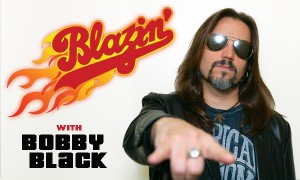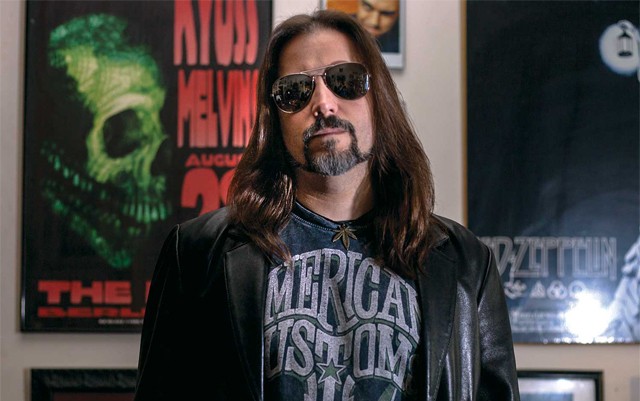Of some people it is said “they saw and did everything.” Of course this is impossible in the literal sense, but there are those who live more incredible lives than others. These people often – through determination or luck or a combination of the two – have careers that allow them amazing opportunities to see and do many of the things they always wanted to.
One of those people is Bobby Black. During his years as a writer for High Times Magazine, Bobby saw and did a lot of amazing things that I’m sure will all end up in a book he writes someday. But for now, Bobby discussed some of those things with me when I caught up with him recently.

The Marijuana Times: What did your parents/authority figures tell you about cannabis growing up?
Bobby Black: When I was little, I used to find packs of rolling papers and feathered roach clips between our couch cushions but never realized what they were until I started junior high and got turned on to weed—around 10 or 11 years old. Then, when I was 13, my mom found a little bong my friend and I had made out of a small plastic soda bottle and a Bic pen that was hidden under my bed while cleaning my room and I got sat down by my parents at the kitchen table for “the talk”. They questioned me about it, and terrified I lied and fumbled to make up excuses. But unlike most of my friends’ parents, they didn’t yell or punish me—instead, they simply told me that I was too young to be messing around with marijuana; that it would interfere with my schoolwork. They told me that when I was older I could make my own decision about it, but asked me to promise I wouldn’t smoke pot until then. I agreed, and that was it. Of course, I did continue to smoke occasionally, and I knew that they continued to smoke in secret behind the locked door of their bedroom at night. Nevertheless, I greatly respected the fact that they had respected me enough to handle it the way they did. That was the last time we spoke about it for almost a decade. Then, on my 21st birthday, they threw me a party at a bar owned by my dad’s friend. When I opened the card from my parents, I was shocked to see a joint inside. My dad said, “We know that you smoke, you know that we smoke, so what’s the point of hiding it?” I went outside and smoke with my parents for the first time and we’ve been open about it ever since.
MT: How did you come to work for High Times?
BB: I started work at High Times during my senior year of college as an intern in the art department. A classmate of mine had gotten an internship there in the ad department, and when she found out there would be another opening she set up the interview for me. I went to meet with the publisher wearing a Led Zeppelin t-shirt and ripped jeans, with no resume or portfolio, and was hired on the spot. Before that, I’d worked at a supermarket, and as a telemarketer.

MT: What was your favorite interview/story you did during your time with High Times and why?
BB: It’s difficult to choose just one favorite story or interview. Feature-wise, I’d say the top three would be my Burning Man article “Black Rock City”, my coverage of the AVN porn awards in Las Vegas “Skin City”, and my expose about what goes on behind the scenes in Amsterdam’s coffeeshop industry called “Coffeeshop Confidential”. As for interviews, I’d say Pantera’s Phil Anselmo might be my best interview ever, as well as Robby Krieger of The Doors and my last interview with HT, Evil Dead’s Bruce Campbell. And though i didn’t write the interview with Black Sabbath’s Ozzy Osbourne and Tony Iommi, I was part of it and got to smoke a bowl with Ozzy at the photo shoot, which is one of the greatest moments of my career and life.

MT: How did the Miss High Times pageant come about?
BB: I got the idea for the Miss High Times contest during the period when I began attending lots of Penthouse magazine parties and hanging out with all of the Pets. They featured a girl of the month each issue, then chose a Pet of the Year each year, as did many other magazines like Maxim and Stuff (“Hometown Hotties” etc.). I thought, “Why don’t we do something similar and give the stoner girl-next-door a chance to be seen and heard?” Originally, contestants would just email some personal info and photos to us and we would choose our monthly ganja girl from that. Eventually, we created a website and began holding an actual pageant—first in Negril, Jamaica for 2 years, then in NYC for 1 year, before streamlining it and incorporating it into the Denver Cannabis Cup on 4/20. The contest ran from 2005 until 2015 and was discontinued after my departure from the company
MT: What are your thoughts on the last 6 years in terms of the success of the legalization movement?.
BB: I’m amazed at the speed of legalization’s progress and am extremely gratified to see the momentum finally on our side. I believe our success is based on several factors: the fact that the internet has made information so readily available that the old disinfo propaganda spewed by the government and other forces of prohibition is now more easily disproven and disregarded; the recent influx of money from private and corporate interests looking to cash in; but most importantly, the decades of dedication and tireless work by the many activists and educators who have refused to remain silent about the benefits of this miraculous plant, in many cases even at the cost of their personal comfort and freedom.
MT: What do you think the next 5 years will bring when it comes to marijuana law reform?
BB: I’m extremely optimistic about the future of cannabis in this country. As more profits and tax revenues roll in and more patients find relief and share their stories, more states will decriminalize and legalize, both medicinally and recreationally. The cannabis industry (and its surrounding/supporting industries) will continue to grow exponentially, the stigma will continue to melt away, and within 5 years marijuana will begin to dominate our media and our economy.
MT: You recently left High Times to pursue other interests, what are you going to miss most about HT?
BB: I think what I miss the most about working at HT is the comradery I used to feel with so many of my colleagues. For many years, we were really like a family—working together, partying together, traveling together…I’ve forged some life-long friendships and accumulated a vast array of incredible, unforgettable experiences. It was truly fantastic. Of course, the company has changed a great deal over the past few years, and most of the crazy stories we lived through would never be possible now. But I’m very grateful and fortunate to have been such a big part of the magazine during its golden years.
MT: What projects are you involved with now?

BB: Since leaving HT, I’ve started my own company (Bobby Black Development, or BBD, LLC) and partnered with the up-and-coming new network ReVolver Podcasts to host my own podcast called Blazin’ With Bobby Black (available on iTunes and revolverpodcasts.com). In addition, I’m moving to Southern California next week, where I will begin developing several multimedia projects and pursuing some new business opportunities on the West Coast (which I’m not at liberty to discuss just yet). But rest assured, you’ll be seeing and hearing a lot more from me in the near future.
If what Bobby has accomplished in the past is any indicator, what he’ll produce in the future is sure to be impressive.







Nice to hear about Mr. Black. But what, specifically, happened to former editor-in-chief Chris Simunek? Easily the best writer at HT, his departure has left a hole in the magazine. Was his departure voluntary? The reason I ask is because the magazine is becoming more formal now, more business-oriented. Such a move goes against the magazine’s outlaw beginnings. And Simunek enjoyed being seen, at least, as a bit of a nonconformist. Again, the magazine just isn’t so fun without Chris Simunek somewhere on the staff. Too bad.